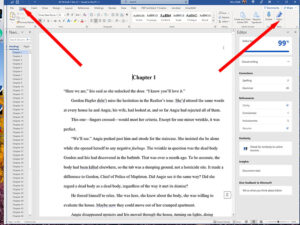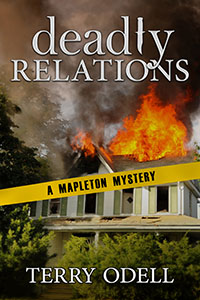Automated Editing? Or Not?”
Terry Odell
 In the process of doing the final pass of the manuscript for Deadly Relations before sending it to my editor, I ran checks through several automated programs. I use SmartEdit to check for overused words and phrases, adverbs, etc. I’ve reported about that here at TKZ before. People have talked about using Grammarly (SmartEdit doesn’t check for grammar), so I tested that with a few chapters. (I used the free version. Premium mileage may vary.)
In the process of doing the final pass of the manuscript for Deadly Relations before sending it to my editor, I ran checks through several automated programs. I use SmartEdit to check for overused words and phrases, adverbs, etc. I’ve reported about that here at TKZ before. People have talked about using Grammarly (SmartEdit doesn’t check for grammar), so I tested that with a few chapters. (I used the free version. Premium mileage may vary.)
I wasn’t impressed, as almost every suggestion Grammarly made was “wrong” but I had to look at them to decide. Time suck. And, I had to know enough grammar to recognize when the suggestions were valid, optional, or off-the-wall. A while back, John Gilstrap talked about discovering an Editor function in Word, so I gave that one a shot as well. Most of the suggestions the Editor gave me dealt with commas. I agreed with some, disagreed with many—mostly about commas before “but”. Enough so I looked it up, because Mr. Holtby in HS English drilled into us that ‘but’ can connect two independent clauses, but you needed to use a comma. The Google Machine agreed. I don’t know why the Editor didn’t.
Which brings me to the main ‘flaw’ with these automated editing helpers. They’re not set up for fiction, and they can’t read in context.
 Example: The jerry can sat in a spreading puddle of liquid. Both Grammarly and Word’s Editor told me that “can sat” is incorrect usage. It didn’t understand that “can” is a noun in that sentence.
Example: The jerry can sat in a spreading puddle of liquid. Both Grammarly and Word’s Editor told me that “can sat” is incorrect usage. It didn’t understand that “can” is a noun in that sentence.
And never mind dialogue, which comes from the character and many rules fly out the window because people don’t speak with perfect, rule-abiding grammar. Or jargon. Many of my characters in this book are cops, and they use “cop speak” which doesn’t follow the rules of grammar.
There’s also the case of voice, which is mine, and I’m not changing my style for any automated program.
Then there’s the section called “Inclusiveness.” Mr. Gilstrap opened a big discussion when he talked about what the Editor flagged in that category for him, so I did a deeper dive. Editor flagged several spots where it thought some people might find my word choices offensive. Not offensive in a profanity way, but rather reinforcing biases and stereotypes.
Here are some examples of what I’d written and what (and why) the Editor suggested changes. It also gave suggested words to substitute. Some made sense. Some didn’t.
“Be home soon.” Gordon put his SUV in gear—only a little white lie that he was already on his way—and headed for home.
You might consider using different language to avoid equating “black” with negative or “white” with positive. Although this term doesn’t directly refer to race, these connotations can unintentionally reinforce racial stereotypes and biases.
A high-pitched voice—Frieda’s—called to Moose. The dog, tail wagging, bounded to the front porch. “Who’s there?” Frieda clutched the dog’s collar. Moose, still eyeing Gordon warily, sat by her side. Not that the frail woman could restrain him should the dog bolt.
Some expressions may draw undue attention to age or imply negative attributes due to a person’s age. Consider removing unnecessary, negative, or condescending references to age.
The coating of dust on the three-inch wide rungs was disturbed by what Gordon interpreted as the toe end of boot prints. Man-sized.
Some terms may suggest negative attitudes or stereotypes related to gender roles or a person’s gender identity or expression. Consider avoiding expressions that may imply bias.
Other usages the Editor pointed out:
- Gordon checks his manpower spreadsheets.
- He refers to someone manning the front desk.
- He searches for a character using her maiden name
- Gordon faces a gunman.
After a little digging, I discovered you can adjust the settings so the Editor checks only for what you want it to. (Note: You should also be sure you’ve selected “Casual” rather than “Formal” or “Professional” before running any checks.) Under “Inclusiveness” I found the following options:
- Age Bias
- Cultural Bias
- Ethnic Slurs
- Gender Bias
- Gendered Pronouns
- Gender Specific Language
- Racial Bias
- Sexual Orientation Bias
- Socioeconomic Bias
Now, I’m of a generation that remembers the addition of “Ms” to the honorific options. I remember what we referred to as “Women’s Lib.” I asked my daughters about some of the usages the Editor flagged, and they agreed with the sentiments behind them, and didn’t think the Editor was out of line. Their social and professional circles differ a great deal from mine. But they also agreed that reading a novel wasn’t the same as face to face talking to other people.
The Big Question is “How does this apply to fiction?” Word doesn’t have a setting for that. And, if you’re writing in Deep POV, everything on the page should come from the character’s voice. Will I consider the words the Editor said were biased? Yes. Will I make all the changes the Editor suggested? No. Because my characters don’t talk that way. At least now. Will they change with the times? Maybe.
**Note. We here at TKZ value our readers’ comments and discussions. Recently, we’ve been having some issues with leaving comments. If this happens to you, we hope you’ll understand. And keep trying. Our web guru is working on the issue.
 Coming Soon! Deadly Relations.
Coming Soon! Deadly Relations.
Nothing Ever Happens in Mapleton … Until it Does
Gordon Hepler, Mapleton, Colorado’s Police Chief, is called away from a quiet Sunday with his wife to an emergency situation at the home he’s planning to sell. A man has chained himself to the front porch, threatening to set off an explosive.
 Terry Odell is an award-winning author of Mystery and Romantic Suspense, although she prefers to think of them all as “Mysteries with Relationships.”
Terry Odell is an award-winning author of Mystery and Romantic Suspense, although she prefers to think of them all as “Mysteries with Relationships.”

No.
Are we voting?
No – because the MOST important thing a writer develops is VOICE – and the programs don’t understand voice in fiction. They might editing you into the style of Hemingway – but they’re not touching my sentences except to count how many times I’ve used each word, and 2-word, 3-word, and 4-word phrase (AutoCrit does that for me on request). I usually didn’t mean to (my scenes can take days to write, and my chapters can run 15K, so it happens).
After having been shown the lists, I decide on each occurrence, rewrite if necessary, and run the scene through AC again. Then listen to the robot voice read it to me.
But I make the decisions. I can split hairs just fine by myself, if required.
AC is a glorified counter for me – and that’s all it’s ever going to be.
I totally agree, Alicia. Every comment needs to be addressed, and until there’s a “use Terry Odell’s voice” option, I don’t think these programs are ready for fiction. (If I did, this would have been an entirely different post.)
My short story, “Investment,” set in the ’50s, opens with two characters discussing rude events in another town, using the N-word in their dialogue. I wanted to establish that these are simple people, people of the land. Nothing does that quite like the N-word. Moreover, it’s a story of redemption, and it’s no good redeeming a character if he doesn’t need any.
Recently, a new person in our writing workshop got “very offended” by a chapter where the MC, a person of paltry pigment, characterizes tourists of various other nationalities as easy to fool, tight-fisted, jolly, etc. I cut the visitor off, explaining that we don’t criticize content, especially dialogue, only the writing, itself. We proceeded, despite her protest, and she remained quiet. But our member stopped reading that work in subsequent meetings.
Your thoughts, Terry?
If a newcomer can’t abide by the ‘rules’ of the group, then they’re in the wrong group. Doesn’t sound like they had anything of value to add to your work, so I wouldn’t mourn the loss.
On another note, realistic or not, the N word is offensive to many and that might create entirely different problems for placing the work. I’m not sure the usage would convey “people of the land” to me, even if it’s common usage in the times.
Thanks. The new person has settled in well, with minimum political gibes and seems to be focused on the prose. Hers is quite good, with a distinct voice.
You’re probably correct. To me, the word conveys a sense that the speaker is illiterate, ignorant, and crude. Which the MC is, as the story opens. But the important point is that he’s biased. He soon finds himself deeply ashamed of that fact and becomes a little less ignorant by the story’s conclusion. Thanks for your input.
Terry, after using Grammarly for more than a year, I’ve come to the same conclusions as you. While the program can be helpful for some things, it can be a hindrance for others. As with all software programs of this type, I use it judiciously with an eye toward DPOV and other stylistic preferences that the program doesn’t account for. We authors need recognize, the human element is so much more reliable in these things than the mechanical! 🙂
For my writing, Grammarly’s hindrance factor outweighs the helpful at this poin.
Thought-provoking post, Terry.
If you want bland, meaningless fiction, contort language into words that never offend anyone.
A character in my WIP had a stroke–she’s frail and limps. I’m not going to describe her as differently abled b/c that destroys the image readers see in their minds.
A main character is an attorney who’s black and Jewish. His children have a white mother. Several characters are Native American and two are alcoholic. One is Native and black. A seven-year-old boy is on the autism spectrum.
My authenticity readers (not sensitivity readers) review cultural aspects I’m not familiar with. I also consult legal, medical, and technology experts for correctness and accuracy.
Fictional characters need to be authentic but I won’t constrict them to make them fit current biases.
I’m with your, Debbie. Keeping readers turning pages doesn’t mesh with bland, meaningless fiction. So far, these AI suggestions for my prose don’t help the story. My editor and early readers do that.
I prefer Pro Writing Aid (Premium) to Grammarly as it does recognize fiction from other forms of writing (in the dropdown menu). But, as you mentioned, I disregard many changes. For example, it has no concept of voice or story rhythm, although sometimes it surprises me. What I like about it is the more you use it, the more it learns your style, and the less it flags for style choices. You can also tell it to disregard certain things. Perhaps I should write a how-to post about Pro Writing Aid. Thanks for the idea, Terry!
I’ve not used Pro Writing Aid, so yes–I’d look forward to a post on that. My editor has told me it often takes her a day or two to get into my voice and the characters before she can get down to the nitty gritty.
I second Terry’s motion. I would love to read a post by you on Pro Writing Aid Premium.
Done! I’ll work on it for Monday. 😀
Awesome! I look forward to that, Sue. I’m also a ProWritingAid user. Thank you.
I agree, Pro Writing Aid is much better. It points out if I write the same word twice by mistake or stupid spelling mistakes. But it’s no substitute for self-editing.
I also use Pro Writing Aid Premium. It has strengthened my writing with it’s suggestions. That is what most of the flagged sections are, not necessarily errors. It even words the flagged section as, “You may have…” I use the style report to tighten my writing. I have purchased the lifetime subscription.
Thanks, Terrry, for all the research and the reports on SmartEdit, Grammarly, and Word’s Editor function. Very helpful.
I agree with Debbie’s comment: “Fictional characters need to be authentic, and I won’t constrict them to make them fit current biases.”
My pleasure, Steve. I’m all about sharing what I’m learning.
Great post. I remember in one of my short stories an editor changing “He don’t know squat” to he doesn’t know anything.” It was dialogue and I thought the original told a lot about the character.
I use the Word feature to catch punctuation errors and I don’t always agree with what they advise. And to catch when I sometimes use the same word twice.
Characters should be allowed to have their own voices, Patricia. That means they won’t adhere to the ‘rules’ and that’s (IMHO) where all these programs fall down. It’s FICTION.
I had an editor once who kept changing my dialogue to complete sentences. Drove me nuts! (She would have made that: It drove me nuts. Ahhhhh!!!)
AAARRRGH. I believe Mr. Gilstrap gives his editors a style sheet letter so they leave his characters alone.
Sort of a comment on the subject of crazy editing, but it came from a human, not a machine. Back in the days when I was still gainfully employed, at one time I worked for a company writing small apps against a proprietary database to make it easier for the end user to ferret information out of it. Any applet came with a set of instructions that contained the code (usually 20-30 lines) as well as the standard usage steps. The company’s process, which was considered sacrosanct, included the step of passing all written communications with the client through this one woman’s desk who was considered a walking and talking grammar style book. I sent my applet paper to her, and two days later it was returned to me with all the code redlined for not following standard English grammar rules. The rest of the paper was fine, only a few misspellings. But she wanted the computer code to abide by grammar rules. I sat there in disbelief for a few moments, until I realized that the steps said I had to submit the paper, but not necessarily follow her recommendations. She tried to confront me in a managers’ meeting, but was largely ignored. I view most automated grammar programs along those lines.
All I can say to that, Joe, is Sheesh
Having computer code edited for grammar mistakes is just hilarious. And you gave me a good idea for a story.
Very interesting post, Terry. The idea that we should sanitize our prose on the altar of “inclusivity” is frightening. It hints of Orwell’s writings.
I also use ProWritingAid, but I’m not as sophisticated a user as Sue. I’m mostly looking for grammatical errors and overused words. I’m tuned to the melody of my writing, and that means I may not be as word-efficient as ProWritingAid would like me to be.
All of these programs have their uses, but they’re not the ones in charge. We are, and we need to remember that. Thanks, Kay.
Thanks for sharing your experiences with automated editing, Terry. Fascinating and instructive.
Like Sue and Kay, I use ProWritingAid but am also not a sophisticated user, though I do venture into style territory for non-fiction. I’m very cautious using it with fiction for more than a copy edit check.
You’re welcome, Dale. Nothing can replace my editor, but these “aids” can me she doesn’t have to work as hard with the tedious grammar stuff and can get to the story, which the aids are clueless about.
And then there’s my latest situation where I not only include Spanish text but slang Spanish delivered by gangsters. So: Gang/Slang/Span.
I didn’t even try auto-edit on that.
(good post, Terry)
Thanks, Harald. I have no idea how any of these programs deal with foreign (is that a non-inclusive term now?) languages. I think SmartEdit has a check option for non-English. As long as you have a way to verify the usage, I’d say you’re fine.
Looks like Terry ODell raised a ruckus here and that ruckus, as far as I can figure out is how far do we let machine made political correctness and inclusivity bend our ideas out of shape on the altar of sensitivity?
We had this discussion in my writing group about racial epithets-which seem to be a universal human expression-and the consensus was to ask “Does it serve the story?” If it does, leave it where it is, but don’t use it for shock value-that’s a cheap gimmick.
That’s me, Robert. The rabble-rouser.
If I’m being “me”–let’s say on a panel at a writer’s conference, I’d be more inclined to be inclusive. In my fiction? Not so much.